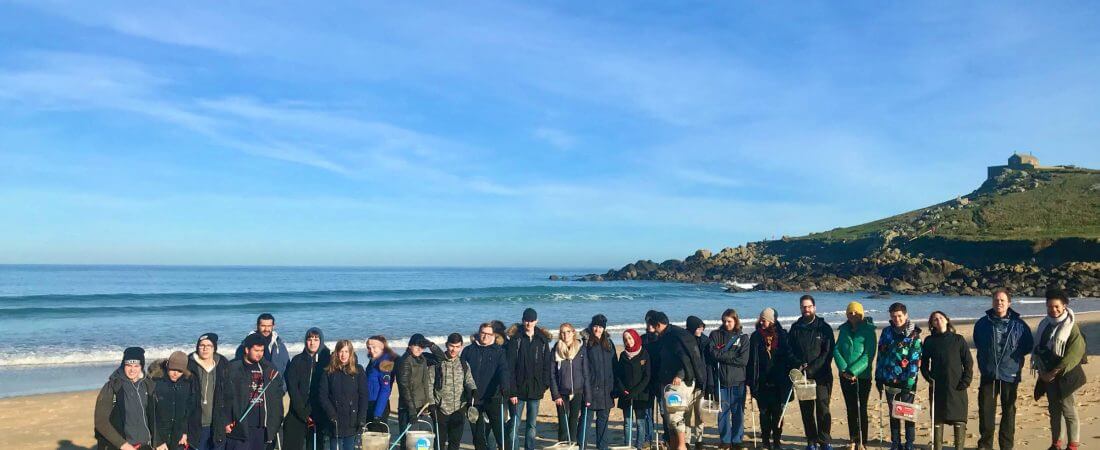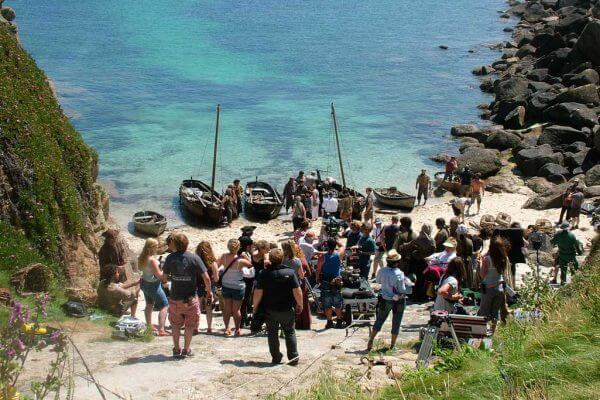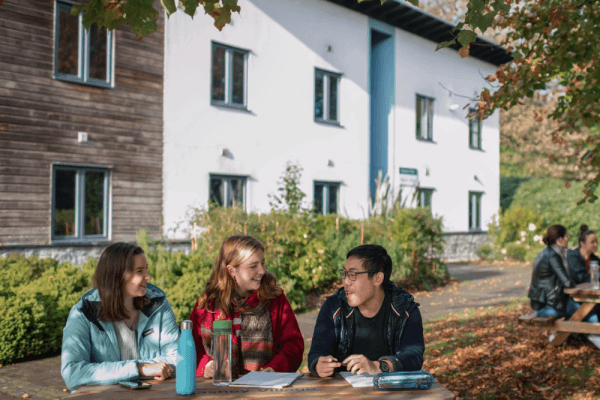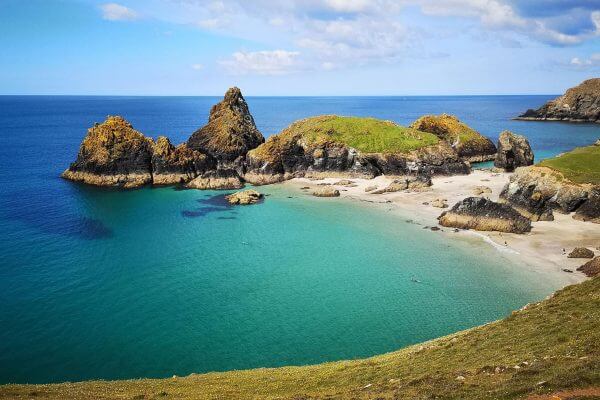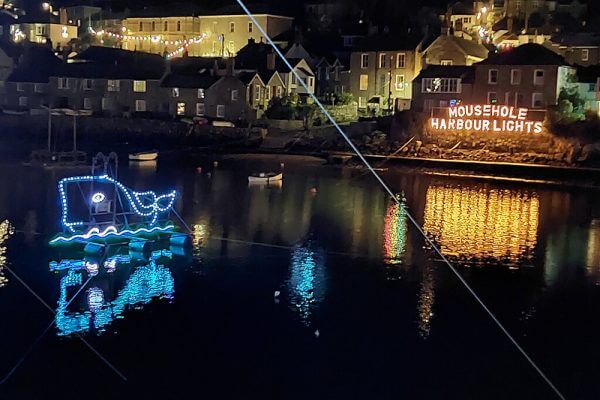Summer School beach cleans with Beach Guardian

Engaging students in environmental awareness & action

When we see Cornwall’s breathtaking coastline, we often think it is pure and untouched.
However, like almost everywhere in the world, it has been changed beyond recognition by humans. Our impact on the world is complete and that impact affects everyone, wherever they live. What happens in the sea and on the land around Cornwall will have a direct effect on people in Morocco, India or the United States.
Our oceans and lives are interconnected and so we all share a responsibility to look after our local environment and we should take pride in the fact that our actions will have a global impact.
One of the magical things about our beach cleans with Beach Guardian is how they inspire us to think about our connection to the planet as a whole.
There is no guilt involved in a beach clean. It is a fascinating scientific exercise to examine what’s really washing up on our beaches.
For example, there are the most beautiful mermaid’s purses and even seeds from South America to be found on the shore line.
These natural items washing up on the beach are just as important to look at as the plastics and man-made objects we may also find too.
That’s where the expertise and enthusiasm of Beach Guardian comes in…


About Beach Guardian
Beach Guardian is a community-driven environmental initiative based in Cornwall, co-founded by father-daughter duo Rob and Emily Stevenson.
It all began in 2017 with a mission to combat plastic pollution through beach cleans and environmental education. They started by organising regular clean-ups around local beaches.
This small project quickly gained momentum with the launch of their Facebook page. Through social media, larger community clean-ups were organised and even more people became connected with their cause.
A pivotal moment in their journey came in 2018, when Emily wore a dress made from discarded Walkers crisp packets to her graduation. This bold statement drew global media attention and led to real positive changes, including Walkers launching a recycling scheme for their packaging.
Over time, Beach Guardian has expanded its outreach, conducting educational workshops in schools and developing partnerships with local businesses to further its mission. These days, Emily is working on academic research to address the environmental impact of plastics, reflecting the charity’s commitment to both immediate action and long-term scientific solutions.
Their work has connected thousands of volunteers, reached millions through social media, and helped raise awareness of plastic pollution in oceans globally.

Exploring climate issues in the classroom
At Language Tree, we know it is essential and unavoidable to discuss climate issues in the classroom.
We have specifically chosen the National Geographic Outcomes series of course books to ensure key environmental themes thread through our courses.
Then, through our beach cleans with Beach Guardian and other excursions like when we visit the Eden Project, we hope to go beyond climate discussions and to engage in simple activities and habits that are important to embrace as we learn to live with climate change.
Being part of an International Summer School, it is always fascinating to hear diverse opinions on the issues based on people’s experiences in different parts of the world.
Our beach clean excursions
We often do our beach cleans at the weekend as part of a full-day excursion. It is great to have the time to complete the beach clean and look at our findings without feeling there is a rush.
This also gives us time to really enjoy the stunning beaches and coastline where we do the beach cleans.
The area, a little way west of Padstow, is known as Trevose Head. The headland’s striking landscape serves as an impressive reminder of why it is so important to preserve the beauty of nature.
Upon arrival, our students are introduced to Rob, who kicks off the afternoon with a fascinating educational talk right on the beach itself. Rob and his team guide us through the different types of debris found on the shore. They explain how to distinguish between man-made and natural materials. We learn eye-opening facts about ocean pollution, whilst handling microplastics and other objects from previous beach cleans. It’s powerful to consider how far these tiny items travel around the world.
Equipped with gloves, litter pickers, and bags—which are made from discarded festival tents!—students then set out to explore the shoreline and collect waste. We get to see firsthand how our oceans are impacted by human activity. However, even more poignant is the realisation that we can impact it positively with just an hour or two of collective action.
With the beach clean often yielding interesting finds, such as decades-old plastic or even historical objects, the experience brings the issue of marine pollution to life in a tangible and unforgettable way. Students finish feeling satisfied and invigorated by their contribution to cleaning up the coastline.

These beach cleans go beyond the classroom…
They reinforce the environmental themes of our lessons while offering students the chance to engage in a local community project during their time in the UK. In addition to making a real difference to Cornwall’s beaches, we all benefit from the wellbeing that comes with outdoor activity, connecting with nature, and fostering a sense of environmental responsibility.
It’s a rewarding, eye-opening experience that stays with our students long after their time in Cornwall.
Once the beach clean is finished, what better way to wrap up the experience than by exploring the gorgeous coastline we’ve just cleaned up!
Unlike how the South Coast gently slopes towards the sea, with its rolling hills and quiet beaches, the North Coast is known for its dramatic cliff faces and impressive surf. On our beach clean day, we get to explore Trevose Head.
This fascinating area has diverse appeal. Not only is it a favoured spot for bird watchers but students will see surfers enjoying the waves on Constantine Bay – we may even have time for a surf lesson ourselves 🙂
We also stop to look at the Lifeboat Station, backdropped by the headland’s imposing cliffs. On a lucky day, we might even get the chance to spot a seal or two in the water below.
It’s the perfect way to wrap up our inspiring experience with Beach Guardian, taking this moment to connect with the landscape and its beauty.

Sustainability at Language Tree
We’ve already touched on how we try to bring environmentalism into our classes, but there are so many more ways to engage with this important issue.
At Language Tree, we recognise that it is the responsibility of all businesses to make efforts to be more sustainable.
Some of the things we do at Language Tree are:
- Use course books in class – we have class sets of course books to minimise on using photocopies in the classroom
- We use a variety of forms of transport to try to ensure efficient travel. We use local trains and buses for some excursions.
- We encourage our students to come to Cornwall by train.
- We provide (nearly) all meals on campus to avoid the waste connected to giving students packed lunches.
- At the weekends, we give students packed lunches for our full-day excursions. We have worked with the university to minimise plastic waste in our packed lunches.
- All students bring their own water bottle to use throughout their stay.
Beyond that, we are happy to be surrounded by sustainable efforts all around the Penryn Campus. Across the university grounds, there is fantastic access to recycling bins and rewilding projects that have won the campus the Green Flag Award on multiple occasions.


Cornwall is home to a host of brilliant environmental projects, big and small.
As well as Beach Guardian, there are several marine conservation groups doing significant work to protect and improve the Cornish marine environment.
There is also a growing awareness of the importance of reducing food miles and making the most of our local produce. The Eden Project & Heligan provide excellent examples of organisations demonstrating and discussing sustainable farming
Cornwall has been an early pioneer of wind farms and will soon be home to the first deep geothermal power project in the UK.
Even the important biodiversity of Cornwall’s striking hedgerows are protected by law!
Environmentalism is at the core of Cornish identity. Visiting the historic country homes around Cornwall – like Lanhydrock & Trelissick – we are reminded of how our ancestors treasured and celebrated nature.
As a school, we are proud to share and promote these ideals with our students.

